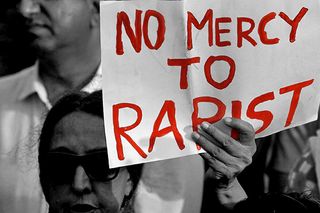
The Dehradun Boarding School Gang Rape Is Outrageous. It’s Also Part of a Trend.
Institutions that protect violent men can be found from Hollywood to Uttarakhand.

Four students, all 17, at a Dehradun boarding school are being held by police for allegedly gang raping another student, 16, reports The Indian Express. The assault happened last month, but seems to have been covered up until now by the school’s director, principal, administration officer, his wife, and a hostel caretaker, who have all been arrested for alleged destruction of evidence.
It seems that, when informed of the assault, they blamed the girl, threatened to expel her, and forbade her from telling her parents or sister (also a student) what happened. When the girl realized she had become pregnant from the assault, the administration officer’s wife allegedly gave her “home remedies to terminate the pregnancy,” which made her ill.
Take a moment to burn with horror and outrage. Take a moment to scream, “How could this happen?”
Now take a moment to mourn how entirely unsurprised you are.
The past year has seen a relentless stream of similar reports — institutions choosing to protect predatory men and blame women on whom these men have preyed, rather than support, defend and believe the women. Powerful institutions — from the Catholic Church, to Hollywood, to major corporations, and yes, to the Government of India — have made the news for their attempts to hush up, gloss over, ignore, or even perpetuate violence against women and girls.
How could this happen? Boys watch and learn there is impunity waiting for them, no matter what they do. Institutions see other institutions protect the misdeeds of men over the safety of women and feel reassured in their decision to do the same. That’s how it happens. Just as violence becomes normalized upon repeat exposure, so does our response to it.
Sadly, our response to it so far has been to meet violence with violence; the recent amendment to the Protection of Children from Sexual Offences (POCSO) Act made punishments for rape and gang rape of women and girls harsher and included a death sentence for the rape of girls under 12 (which arguably puts young girls at risk of greater violence).
Let’s be clear: Punative justice is necessary; individuals should be held accountable for their crimes, and their punishment can be an example to others — a statement of the values a society collectively upholds.
But not if society is simultaneously making other, louder, statements that contradict such a message; then, punishment becomes a flash in the pan, an exception. The voice of, say, the MLA who promised to kidnap girls in order to win votes from men in his district, rings louder than any potential guilty verdict in this case could. The silence of the government in the aftermath of the Kathua and Unnao rapes was more deafening than a guilty verdict in this case could ever be. A university’s choice not to abide by their own sexual harassment guidelines in order to protect a male faculty member with a history of misconduct, says more about the collective values of our society, than any potential guilty verdict in this case.
De-institutionalizing violence against women requires cleaning house from the very top; it requires public rejection of the sexist attitudes that hold women are only as valuable as their virginity or fertility, and that they deserve whatever violence is coming their way. It requires public rejection of the institutions that uphold these attitudes. Only once we do that, can we ever hope to clean up our schools.
Liesl Goecker is The Swaddle's managing editor.
Related


Will the Government’s Women Safe City Project Really Make Women Safe?
